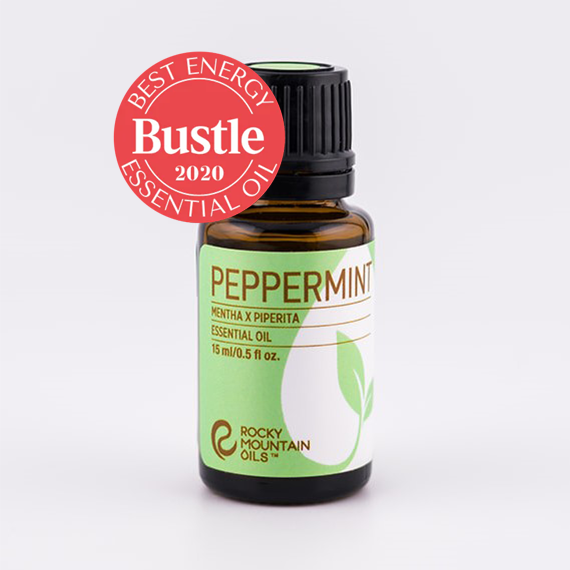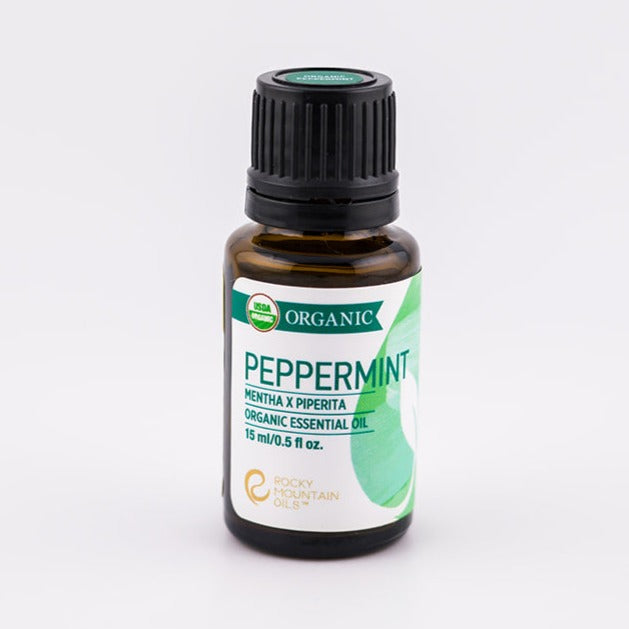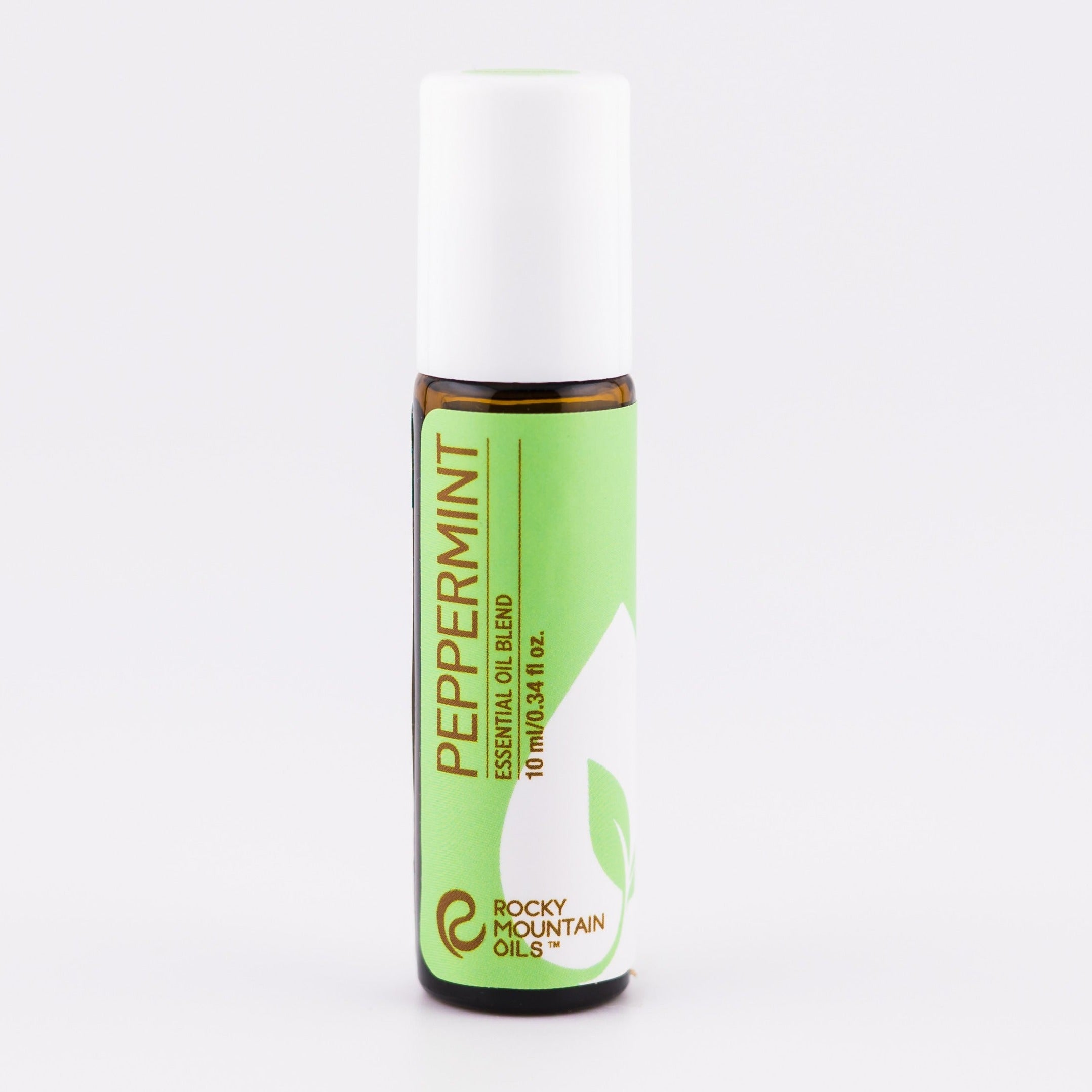Peppermint’s refreshing aroma makes it
great for diffusing or spritzing throughout a
room to help purify the air.

Peppermint Essential Oil
With its sharp and invigorating aroma, Peppermint Essential Oil is a popular oil that offers seemingly endless applications. Some of the most prominent benefits of using this particular oil includes a sharper mind, calmer nerves, and a settled stomach.You can also use Peppermint Essential Oil to clean your home, soothe your scalp, or cool sore muscles. To help you better understand how Peppermint Essential Oil can help you, let’s take a look at its history, how it’s distilled, and some of its other uses.
What Is Peppermint Essential Oil?
The peppermint plant has been around for most of human history. In fact, the name "mint" originally came from Greek mythology. Legend has it that the water nymph Minthe attracted the attention of Hades, ruler of the Underworld, and their mutual attraction eventually led to an affair. When Hades’ wife, Persephone, discovered the relationship, she took revenge on her husband’s mistress. When confronted, Minthe transformed into a mint plant. Persephone then attacked Minthe, kicking her and releasing the powerfully sweet peppermint aroma.
Out of hundreds of species in the genus Mentha or “Mint”, Peppermint is definitely the most recognized. Peppermint is known as a sterile, naturally occurring hybrid. It is a cross between Watermint (Mentha aquatica) and Spearmint (Mentha spicata).
How is Peppermint Essential Oil Made?
In order to extract oil from the plant’s leaf, most distilleries use steam distillation. This is the most common way to extract oils from a plant. By combining gentle pressure and heated steam, steam distillation releases the essential oil from the plant and into the steam vapor.
Exploring the Peppermint Essential Oil Benefits
If you’ve ever popped an after-dinner mint or grabbed a pack of peppermint gum from the grocery store checkout line, you are familiar with that “minty-fresh” feeling. It’s that same aroma and flavor that offer a wealth of Peppermint Essential Oil benefits.
-
Peppermint Essential Oil for Muscle and Joint Pain
After a hard workout, use Peppermint Essential Oil to help soothe those aches and pains. Simply blend the Peppermint Essential Oil with a carrier oil and massage into skin at the affected areas. You can also add a few drops of Peppermint to a post-workout bath.
-
Peppermint Essential Oil for IBS
Irritable Bowel Syndrome (IBS) affects an estimated 10 to 15% of the population worldwide. In most cases, those who suffer from this particular gastrointestinal syndrome experience frequent stomach upset, diarrhea, and general abdominal pain, each of which are often triggered by stress. At Rocky Mountain Oils, we typically don't recommend ingesting oils, but if you choose to do so, consult a certified aromatherapist or medical professional. Many
-
Peppermint Essential Oil for Headaches
Some studies show that using Peppermint Essential Oil may help to alleviate headaches.The National Center for Complementary and Integrative Health reports that people have used Peppermint topically for tension headaches, “and a limited amount of evidence suggests that it might be helpful for this purpose.”
-
Peppermint Essential Oil for Energy and Focus
What’s more invigorating than a cup of coffee? The sharp scent of peppermint. If you are looking to improve your focus and alertness, diffuse Peppermint Essential Oil in your home or office. You can also get fired up for a workout or exam by inhaling the scent with a few deep breaths.
-
Peppermint Essential Oil for Sinuses and Allergies
Got a stuffy nose that just won’t quit? Open up your sinuses by inhaling the sharp aroma of Peppermint Essential Oil. Create a natural chest rub by simply blending Peppermint Essential Oil with a carrier oil, such as Fractionated Coconut Oil. You can also add a few drops of Peppermint Oil to a bowl of steaming water and inhale the steam.
-
Other Noted Benefits of Peppermint Essential Oil:
- Reduce nausea and morning sickness
- Relieve itchiness from bug bites
- Deter pests in and around the home
- Use in shampoo for hair and scalp care purposes

Fun Facts About Peppermint
- The ancient Greeks believed that peppermint cured hiccups.
- The United States produces most of the world’s peppermint supply (about 75%).
- The active ingredients in Peppermint Essential Oil are menthol, menthone, and menthyl acetate—the latter giving it the distinct “minty” fragrance.
- It takes around 250 pounds of mint leaves to create a pound of Peppermint Essential Oil.
- Ancient Egyptians used mint as a currency.
How to Use Peppermint Essential Oil
- Add a few drops to Epsom salt, and use in the tub as a muscle soak.
- Mix with Fractionated Coconut Oil for a chest rub, or to apply to sore muscles.
- Add to a diffuser to give you a mental lift.
- Apply a few drops to a cotton ball and inhale to boost alertness.
- Blend in DIY cleaners to help deter ants and other insects.
- Mix with distilled water, and spritz in a room to purify the air.
Which Oils Blend Well with Peppermint?

Peppermint Essential Oil Recipes
Sore Joint Soothe:
- 7 drops Peppermint Essential Oil
- 3 drops Sweet Marjoram Essential Oil
- 2 drops Organic Turmeric Essential Oil
- 2 drops Lavender Essential Oil
- 2 tablespoons FCO - (Fractionated Coconut Oil)
- Mix ingredients together, and apply to the hands, wrists, or knees as needed.
- 10 drops Peppermint Essential Oil
- 5 drops Lemon Essential Oil
- 5 drops Fennel Seed Essential Oil
- 2 drops Ginger Root Essential Oil
- 2 drops Lavender Essential Oil Add drops to an Aromatherapy inhaler and keep mixture on hand for those long car rides! Deeply inhale when feeling car sick or drowsy!
Using Peppermint Essential Oil Safely
Always use Peppermint Essential Oil with caution. Do not apply the oil directly to the skin of children under the age of 6. Check with your healthcare provider before using if you’re pregnant or nursing. Apply with a carrier oil for topical application. Click here for dilution rates.



